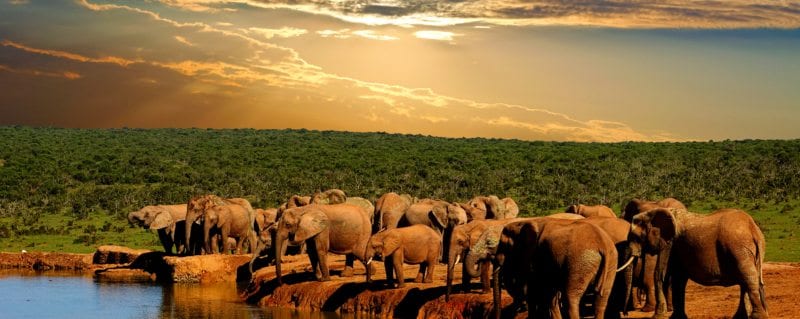Addo Elephant National Park is less well known than the ever-popular Kruger National Park in the northeast of South Africa, and much less visited. In fact, Addo National Park is something of a hidden gem, with a plethora of South African wildlife.
It’s located a short drive from Port Elizabeth in the Eastern Cape, near the Zuurberg Range in the Sundays River Valley, and is the third-largest national park in the country. It spreads for a huge 180,000 hectares through a range of landscapes, encompassing mountains, river valleys and miles of bushland, right down to the coast of the Indian ocean and beyond, where a marine reserve forms part of the park. There are expansion plans in place presently that will see the park double in size, turning it into a mega park that will no-doubt feature more heavily on the tourist trail.
Although famed for its 550-strong elephants, Addo Elephant Park is home to the big five animals (or as their promotional materials state, the “big seven” animals, including Southern Right whales and Great White shark in the marine reserve), as well as zebra, warthog, a variety of antelope, and spotted hyena. The lion and leopard population is relatively sparse, and you’ll be very lucky to catch a glimpse of either. The park is also home to varied species of birds and reptiles, and unique to the park is the flightless Addo dung beetle, which frequently stops traffic as they wander along the roads (dung beetles have right of way here!).
Worth noting is that Addo is in a malaria-free zone, so visitors can rule out the extra costs and potential hassles involved in taking malaria tablets.
Addo Elephant National Park prices
Foreign visitors are expected to pay a standard conservation fee of R328 per adult per day and R164 per child per day, with a much lower cost to residents. The fee covers you for a self-drive safari around the park. If you wish to travel with a guide or book a game drive, these will be added extras.
Activities at Addo Elephant Park
Addo is a self-drive national park, and driving yourself around the park is very easy, with a range of tarmacked and quality dirt roads on offer. Organised game drives are available all day, from sunrise to nightfall, with a special sundowner drive available with drinks and snacks provided. This sundowner drive is priced at R340, while the standard daytime game drives are R240 and the night drive is R275.
Visitors can also hire a hop-on guide to travel in their car, with prices starting at R180. Horse trails are available for those over 16 years of age, 4×4 tours can be booked and, if you’re feeling fit, you might enjoy the Alexandria Hiking Trail, which is a two day, 36 km circular hike through forests and coastal dunes.
Addo National Park highlights
Those seeking close encounters with elephants will love Addo. From lone bulls to families with calves, a sighting is all but guaranteed. The park is filled with wonderful watering holes, where you can witness the elephant hordes gather to cool off and refresh themselves.

One of Addo National Park’s many elephant herds enjoying a sundowner
Getting to Addo Elephant Park
The closest airport is in Port Elizabeth, which is just 75km away. Travellers flying into there can hire a car, or opt for a privately operated coach tour of Addo from a range of local operators (see our directory of South African safari companies).
If you’re interested in a road trip, the park is set at the end of South Africa’s world-renown the Garden Route. This makes driving from Cape Town a good option, and whilst the Garden Route scenery is stunning, it’s a nine-hour drive from Cape Town to Addo Elephant Park, so you’ll likely want to split the drive over two or more days.
When to go to Addo Elephant Park
The South African summer runs from November to February, and during this period conditions in Addo are very hot and dry. Winter in the park is mild, but the temperatures will dramatically drop at night, so warm clothing is advised for any nighttime or early morning game drives. Rainfall peaks in February/March and October/November.
PORT ELIZABETH WEATHER
Where to stay in Addo National Park
As with most South African national parks, there is a range of accommodation options both inside Addo, and around the surrounding area. Addo has several camps inside the park, each with its own accommodation options. The Main Rest Camp is where visitors will find facilities such as a shop, restaurant and braii areas, as well as a floodlit waterhole where elephants frequently gather at night. Accommodation within the park can get booked up at busy period, so it’s worth booking ahead of time.
Luxury
For those seeking a 5 star safari experience, Addo can certainly deliver. There are a range of luxury lodge accommodation options available, with prices starting at upwards of R3500 per person per night, with a steep rise in tariffs during the popular summer months.
Midrange
Forest cabins and chalets are priced from R640 for a cabin for two, although this may vary depending on the area of the park you wish to stay in. A cosy cottage can cost R960 per night for two people sharing. There are also guesthouses available to rent, which can sleep 4 – 6 people from R2985 per night and are a great option for families or groups.
Budget
If you’re happy sleeping under the stars, prices for a camping pitch for two start as low as just R190 per night, but you must bring your own tent. For a safari tent, you can expect to pay R485 for two per night, which is still great value.
Search & book accommodation in and around Addo:
Booking.com
Have you been to Addo Elephant Park and have something to share? Please let us know in the comments section below.
